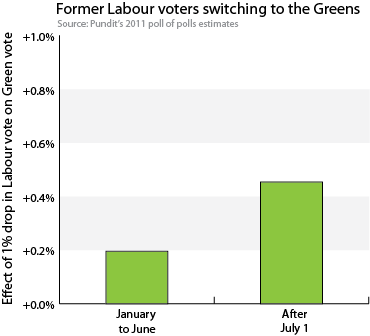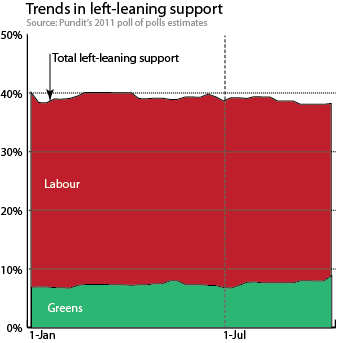Three new polls reinforce an unchanging overall political landscape and underscore a recent trend that is bad for Labour, good for the Greens, and bad for the left generally
Three new polls came out over the weekend. Collectively, they show National gaining further ground, increasing its support to level last seen in late 2009. All the smaller parties are slowly losing ground.
Labour lost about as much support as the Greens gained in these polls, confirming and evening strengthening a broad trend I identified last week.

Using some basic regression analysis on our poll-of-poll estimates, the chart above shows that the proportion of ex-Labour voters who are moving over to the Greens has been rising during the year. In the first half of the year, a 1% drop in the Labour vote was associated with about a 0.2% increase in the Green vote on average, while in the last three months a similar drop in Labour support now leads to around a 0.45% increase in Green support. This trend has three implications:
- Those who think the drop in Labour support translates directly into a decreased probability of a change of government are being overly pessimistic;
- Those who think the growth in Green support translates directly into an increased probability of a change of government are being overly optimistic.
- An increasing number of left-leaning supporters prefer the Greens brand of people and policies to Labour’s brand of people and policies. But, as we will see below, there is not an increasing number of left-leaning supporters.

As the second chart shows, total left-leaning support has been in slow decline since around June after being more or less stable through the first half of the year.
This period of broadly-left decline is the same period in which the Greens have experienced their big rally. Taken together, these trends show that Labour is bleeding support from both edges, losing some left-leaning voters to the Greens and also losing some moderate supporters to either National or one of the small centrist parties.
In turn, this analysis may suggest that Labour’s is less a problem of ideological positioning than it is of communications and execution.
In addition, there was a Marae Investigates poll of Maori voters, showing an interesting race developing in Te Tai Tokerau, a seat crucial to the Mana party’s chances of getting back into parliament. Someone at TV3 didn’t appear to fully understand the difference between this poll (of one non-random subset of voters) and the other polls of the entire electorate.
I hope it was a short-staffed weekend and they had the cleaners doing the political reporting, because that kind of inferential error is pretty basic. For obvious reasons, the Marae poll is not in our poll of polls.
